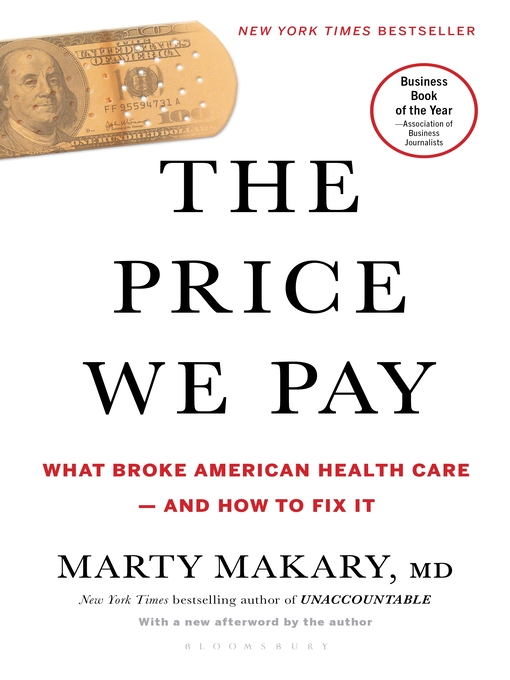
The Price We Pay
What Broke American Health Care—and How to Fix It
کتاب های مرتبط
- اطلاعات
- نقد و بررسی
- دیدگاه کاربران
نقد و بررسی

February 1, 2019
Plain talk from a surgeon and professor who has long studied health care issues and finds the American system badly in need of repair.Makary (Health Policy/Johns Hopkins Univ.; Unaccountable: What Hospitals Won't Tell You and How Transparency Can Revolutionize Health Care, 2012, etc.) has plenty of harsh words for the health care industry. He clearly demonstrates how medical care is secretive and predatory and why skyrocketing costs can be accounted for by the money games of medicine, loaded with middlemen, kickbacks, hidden costs, and the bait-and-switch techniques of the so-called wellness industry. Traveling across the country and talking to patients, doctors, business leaders, and insurance brokers, the author concludes that overtesting, overdiagnosing, and overtreatment are all too common. Throughout the book, Makary refuses to hold back and does not hesitate to name names. However, despite all the wrongs that he describes--e.g., health fairs that serve as prospecting events to hospitals that grossly overcharge--the author is optimistic about the future of health care. He cites as positive examples an organization that negotiates with pharmacy benefit managers for better rates for employers; the national Choosing Wisely project, which promotes meaningful conversations between patients and clinicians; and the Johns Hopkins-based Improving Wisely, which enables physicians to see how their practice patterns and outcomes compare to those of others in their field. Makary, who has witnessed a groundswell of physicians working toward a fair and functional health care system, writes that hospitals and doctors can and should return to their historic altruistic mission of serving their communities and that medical schools must focus on compassion and humility. Some states have already passed price transparency legislation, and consumers, he writes, should ask for a price every time they consider a health service.Makary rightly takes the health care business to task, but he also offers a ray of hope that change can and will happen.
COPYRIGHT(2019) Kirkus Reviews, ALL RIGHTS RESERVED.

Starred review from August 1, 2019
In this thoroughly reported primer, Makary, a Johns Hopkins surgeon and professor of health policy, authoritatively and conversationally explains the money games of medicine. How did costs get so high? Blame overtesting, overdiagnosing, and overtreating. A University of Iowa study asked hospitals what they would charge for the same type of bypass operation; the replies ranged from $44,000 to $448,000. Makary, who visited 22 cities over two years, uses anecdotes liberally and effectively. One patient received an $11,000 bill for altitude sickness treatment. Some hospitals are depressingly litigious. In 2017, the nonprofit Mary Washington Hospital in Fredericksburg, Virginia, sued more than 4,300 patients and garnished the wages of 1,756, according to court records. Makary suggests that people ask their local hospitals if they sue patients. He found that working Americans feel that the system is stacked against them; it seems that they're right. He also critiques the workplace wellness industry, with experts unnecessarily screening healthy people, leading to false positives and harmful medical procedures. Consider this book a powerful call to action for more information about health costs and for restoring the noble mission of treating everyone with fairness and dignity.(Reprinted with permission of Booklist, copyright 2019, American Library Association.)

























دیدگاه کاربران